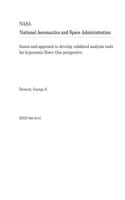
Issues and Approach to Develop Validated Analysis Tools for Hypersonic Flows
Series:
Critical issues concerning the modeling of low-density hypervelocity flows where thermochemical nonequilibrium effects are pronounced are discussed. Emphasis is on the development of validated analysis tools. A description of the activity in the Ames Research Center's Aerothermodynamics Branch is also given. Inherent in the process is a strong synergism between ground test and real-gas computation
NaN
VOLUME
English
Paperback

Critical issues concerning the modeling of low-density hypervelocity flows where thermochemical nonequilibrium effects are pronounced are discussed. Emphasis is on the development of validated analysis tools. A description of the activity in the Ames Research Center's Aerothermodynamics Branch is also given. Inherent in the process is a strong synergism between ground test and real-gas computational fluid dynamics (CFD). Approaches to develop and/or enhance phenomenological models and incorporate them into computational flow-field simulation codes are discussed. These models have been partially validated with experimental data for flows where the gas temperature is raised (compressive flows). Expanding flows, where temperatures drop, however, exhibit somewhat different behavior. Experimental data for these expanding flow conditions are sparse; reliance must be made on intuition and guidance from computational chemistry to model transport processes under these conditions. Ground-based experimental studies used to provide necessary data for model development and validation are described. Included are the performance characteristics of high-enthalpy flow facilities, such as shock tubes and ballistic ranges. Deiwert, George S. Ames Research Center RTOP 506-40-41...
Price Comparison [India]
In This Series
Bestseller Manga
Trending NEWS




















